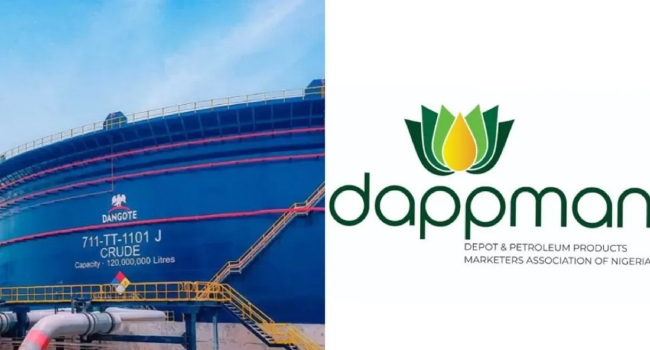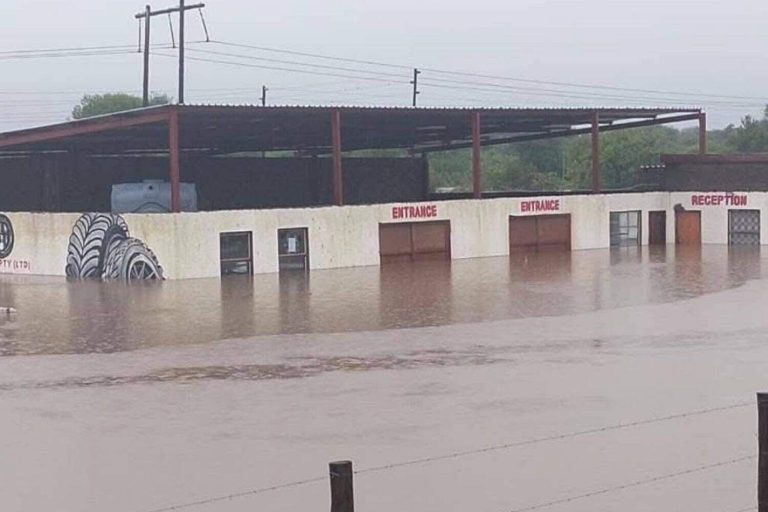
The Dangote Petroleum Refinery has openly challenged the Depot and Petroleum Products Marketers Association of Nigeria (DAPPMAN) to proceed with legal action following the refinery’s recent claims concerning petroleum product smuggling across Nigeria’s borders.
In a statement issued late Wednesday, the refinery stood its ground on comments made in publications dated September 15, where it alleged that certain industry players were involved in diverting fuel to neighboring countries. The refinery asserted that any aggrieved party, including DAPPMAN, is welcome to pursue the matter through legal channels, adding that it will defend its claims through every legitimate means available.
This response comes after DAPPMAN accused Dangote of making baseless allegations, which they said amounted to an indirect attack on key regulatory agencies such as the Nigerian Midstream and Downstream Petroleum Regulatory Authority (NMDPRA), Nigeria Customs Service, and other border control entities.
According to DAPPMAN, Dangote’s public statements not only question the competence of these institutions but also pose a threat to the ongoing reform agenda of President Bola Ahmed Tinubu’s administration. The association reaffirmed its support for deregulation and competition, criticizing what it described as the refinery’s tilt toward market dominance and protectionism.
Ultimatum from DAPPMAN
The association issued a stern 7-day ultimatum, demanding that Dangote retract its claims or provide verifiable evidence proving the alleged product smuggling activities. Failure to do either, they warned, would result in a lawsuit.
“Smuggling is a matter of national security. If there is evidence that any marketer is complicit, let the appropriate agencies act on it. We challenge Dangote Refinery to back its allegations with documented proof, or retract the statement entirely,” DAPPMAN stated.
₦1.5 Trillion Subsidy Demand?
In a sharp rebuttal, Dangote Petroleum Refinery revealed that the heart of the current friction lies in what it described as an attempt by marketers to pressure the refinery into absorbing logistics costs amounting to over ₦1.5 trillion annually.
The refinery claims DAPPMAN had insisted on taking delivery of products via coastal transportation rather than at Dangote’s gantry, a move that would incur additional logistics costs of around ₦75 per litre. Given Nigeria’s daily consumption of 40 million litres of Premium Motor Spirit (PMS) and 15 million litres of Automotive Gas Oil (AGO), Dangote estimated the total annual cost of these additional charges at ₦1.505 trillion.
“Specifically, the marketers are asking us to cover ₦70 per litre in coastal freight, NIMASA and NPA charges, plus an extra ₦5 per litre for vessel pumping just so they can move products from our refinery in Lekki to their depots in Apapa and sell at the same price we offer at our gantry,” the company explained.
Dangote stressed that it has no intention of increasing its gantry prices to accommodate these demands or bear what it views as a rebranded subsidy, a practice it says previously drained government resources for years.
Market Oversupply and Economic Impact
According to Dangote, despite offering competitive pricing directly from its gantry, some marketers have opted to import refined products, effectively undercutting local refining efforts.
Between June and September, the refinery disclosed it exported over 3.2 million metric tonnes of PMS, AGO, and aviation fuel, while marketers collectively imported 3.68 million metric tonnes in the same period a move Dangote described as product “dumping,” which it says threatens Nigeria’s economic stability and refining future.
Dangote also emphasized that it maintains a healthy stockpile of refined products, with 500 million litres in its tanks monthly, and remains committed to meeting domestic demand while supporting exports.
Despite the controversy, the refinery reaffirmed its alignment with the Tinubu administration’s economic reforms and national development goals. It highlighted contributions such as stabilizing the naira, job creation, and positioning Nigeria as a regional refining hub.
“We maintain excellent relationships with regulatory agencies and remain committed to collaborating with responsible stakeholders. However, we will not hesitate to speak out when national interests are at stake,” the company stated.



